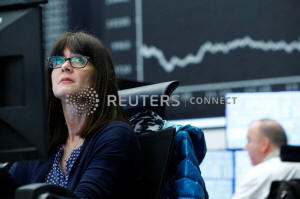Rout resumes as more nations self-isolate against virus
 Send a link to a friend
Send a link to a friend
 [March 23, 2020]
By Marc Jones, Wayne Cole and Scott Murdoch [March 23, 2020]
By Marc Jones, Wayne Cole and Scott Murdoch
LONDON/SYDNEY/HONG KONG (Reuters) -
Financial markets around the world took another hammering on Monday as a
rising tide of national coronavirus lockdowns threatened to overwhelm
policymakers' frantic efforts to cushion what is likely to be a deep
global recession.
European stocks dived 4.5% as they reopened and commodity markets also
saw more heavy selling as the global death toll from the virus passed
14,000.
Investors tried to take cover in ultra-safe government bonds and in the
Japanese yen in currency markets but with so much uncertainty about when
any semblance of normality might return there were few places to really
hide.
"Further deterioration in the COVID-19 outbreak is severely damaging the
global economy," Morgan Stanley analysts warned on Monday. "We expect
global growth to dip close to GFC (global financial crisis) lows, and
U.S. growth to a 74-year low in 2020."

Goldman Sachs sent a similar warning and in a taste of the pain to come,
E-Mini futures for the S&P 500 dived 3.5% [.N] and MSCI's main world
stocks index was down 1.6% and almost at 4-year lows.
UBS Australian head of equities distribution George Kanaan said global
financial markets were gripped by fear, which seemed unlikely to ease
any time soon, despite the co-ordinated efforts of governments and
central banks around the world.
"I have been in the financial markets for 27 years and I have never seen
anything like this," he told Reuters by telephone from Sydney.
"This is unprecedented in terms of fears and there are two elements
driving that.
"First is that this involves masses of people. In the GFC, that was an
event that occurred in the investment banks around the world, it didnít
involve people on the street. The second is that social media is helping
to drive this fear and panic."
In Asian trade, MSCI's broadest index of Asia-Pacific shares outside
Japan lost 5.4%, with New Zealand's market shedding a record 10% at one
point as the government closed all non-essential businesses.
Shanghai blue chips dropped 3.3%, though Japan's Nikkei rose 2.0% aided
by expectations of more aggressive asset buying by the Bank of Japan. In
Australia, the S&P/ASX200 dropped 5.62% to take the index to a
seven-year low.

Globally, analysts are dreading data on weekly U.S. jobless claims due
on Thursday amid forecasts they could balloon by 750,000, and possibly
by more than a million.
U.S. stocks have fallen more than 30% from their mid-February peak and
even the safest areas of the bond market are experiencing liquidity
stress as distressed funds are forced to sell good assets to cover
positions gone bad.
[to top of second column]
|

A trader works at Frankfurt's stock exchange in Frankfurt, Germany,
March 12, 2020. REUTERS/Ralph Orlowski

In contrast to the response by authorities to the global health
crisis, however, are calls from some on Wall Street to ease
restrictions as soon as possible to give the economy room to
recover.
"Extreme measures to flatten the virus 'curve' is sensible-for a
time-to stretch out the strain on health infrastructure," former
Goldman Sachs Chief Executive Lloyd Blankfein tweeted.
"But crushing the economy, jobs and morale is also a health
issue-and beyond. Within a very few weeks let those with a lower
risk to the disease return to work."
MOUNTING ECONOMIC TOLL
The mounting economic toll led to a major rally in sovereign bonds
late last week, with efforts by central banks to restore liquidity
in the market allowing for more two-way trade.
Yields on the benchmark U.S. 10-year note were down at 0.80%, having
dived all the way to 0.84% on Friday from a top of 1.28%. European
benchmarks like German Bunds were at around -0.36% down more than 20
bps from last week's 10-month highs.
Calls were continuing for the euro zone's 19 governments to issue
the bloc's first joint bonds to try to get the region through the
economic crush of the virus lockdowns.
In New Zealand, the central bank announced its first outright
purchase of government paper aiming to inject much-needed liquidity
into the local market.

In currency markets, the first instinct on Monday was to dump those
leveraged to global growth and commodity prices, sending the
Australian dollar down 0.8% to $0.5749.
The U.S. dollar started firm but took a step back after partisan
battles in the U.S. Senate stopped a coronavirus response bill from
advancing.
The dollar eased 0.5% to 110.31 yen while the euro recouped losses
to be up 0.1% at $1.0705.
The dollar had been a major gainer last week as investors fled to
the liquidity of the world's reserve currency, while some funds,
companies and countries desperately sought more cash to cover their
dollar borrowings.
The steady rise in the dollar undermined gold, which slipped 0.3% to
$1,493.83 per ounce.
Oil prices were sharply lower. Brent crude futures dropped $1.30, or
4.9%, to $25.66 a barrel, while U.S. crude was down 29 cent to
$22.34.
(Reporting by Marc Jones, editing by Ed Osmond)
[© 2020 Thomson Reuters. All rights
reserved.] Copyright 2020 Reuters. All rights reserved. This material may not be published,
broadcast, rewritten or redistributed.
Thompson Reuters is solely responsible for this content. |